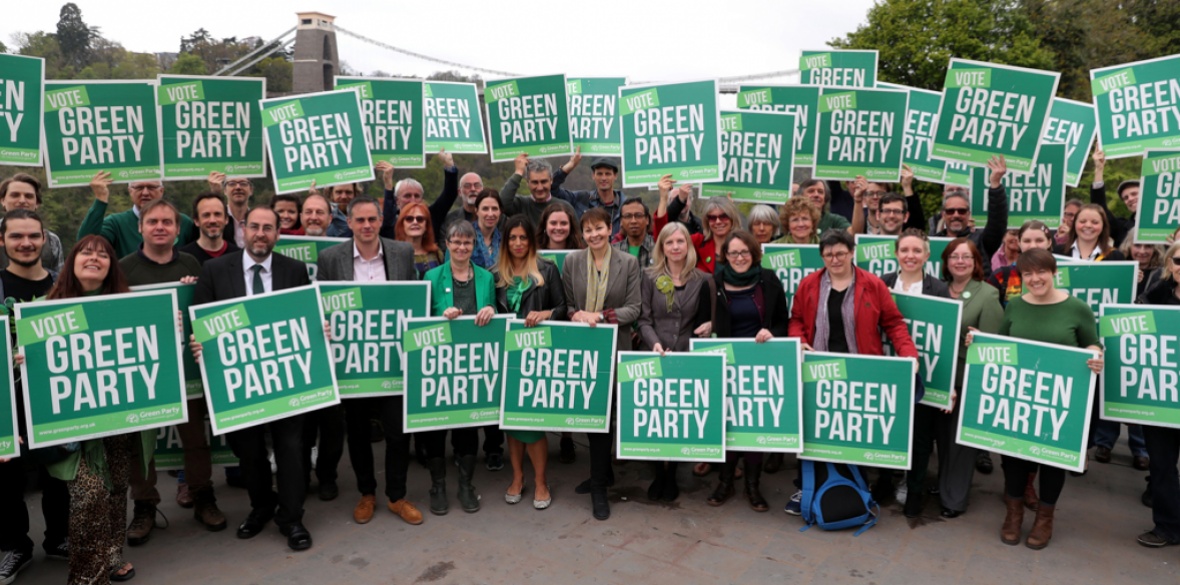This is the last article you can read this month
You can read more article this month
You can read more articles this month
Sorry your limit is up for this month
Reset on:
Please help support the Morning Star by subscribing here
GREEN Party co-leader Caroline Lucas may be stepping down but will continue to play a valuable role as MP for Brighton Pavilion.
The Greens’ sole MP has long been one of Parliament’s most powerful voices in opposition to the sleaze and entitlement that characterise that institution.
The Greens have become a more prominent force in British politics since she first became leader in 2008 and she has done much to add a radical critique of capitalism and injustice to its traditional focus on environmental issues.
For years when other parties did not take the threat of climate change seriously, the Greens trumpeted its significance.
Now no serious politician in Britain denies the reality of climate change and, in principle, the need to act to limit and manage it as best we can — even if, in practice, the Conservative government remains wedded to the active subsidy and promotion of the most polluting forms of energy generation such as fracking.
Lucas’s blistering attacks on the Tories’ racist immigration policies and continued campaigning for a more democratic electoral system deserve full-throated support.
She may be right, however, that allowing a broader range of voices to come forward could strengthen her party and allow it to better navigate the new political terrain opened up by Jeremy Corbyn’s leadership of the Labour Party.
She speaks of having “strengthened our position as a leading force in progressive politics,” but its vote more than halved in the 2017 election compared with that of 2015.
Part of the reason for that dramatic decline is that Corbyn’s Labour offers the radical break with an unsustainable status quo that had allowed the Greens to attract left-wing Labour supporters in the Blair, Brown and Miliband years.
But part is that Lucas’s contention to have “used these unique circumstances to push for even more radical change” is wide of the mark, and the Greens since 2015 have been more a drag on Labour’s radicalism than vice versa.
Labour was right to reject talk of a “progressive alliance” in 2017.
That was true for the obvious practical reason that there were no Green-Tory marginals where a Labour decision not to stand would have made electoral sense, as well as because the social and economic bases of Labour and Green support remain wildly different — so Labour would not be able to guarantee that a refusal to participate would benefit the Greens any more than parties further right.
It was true too because the Green pitch for including the Lib Dems in that “progressive” bracket, despite that party’s collusion with the Conservatives over NHS privatisation, tuition fees and the Royal Mail sell-off, showed an alarmingly vague definition of progress itself.
But it was equally true because the Greens, like the Lib Dems, have spent their time since the referendum on EU membership in 2016 trying to undermine the result, echoing patronising liberal claims that voters didn’t know what they were voting for and spinning a fairy-tale version of the EU as a progressive and democratic entity.
What limited environmental protections exist in EU law must be maintained and strengthened, but the Greens have seemed blind to the fact that adopting the rules of the single market, EU competition law and EU-promoted international trade agreements such as the Comprehensive Economic and Trade Agreement (Ceta) or Transatlantic Trade and Investment Partnership (TTIP) that allow private companies to sue governments for interfering with their profits sound the death-knell for any serious action to protect the environment.
That serious action depends on a government able and willing to face down the interests of private capital.
At the moment such a government became a realistic possibility in Britain, the Green response was too often to try to limit Labour’s room for manoeuvre.
It’s to be hoped that the Greens’ next leaders rediscover the radicalism that has served their party well in the past. Their members have a great deal to offer the left.










